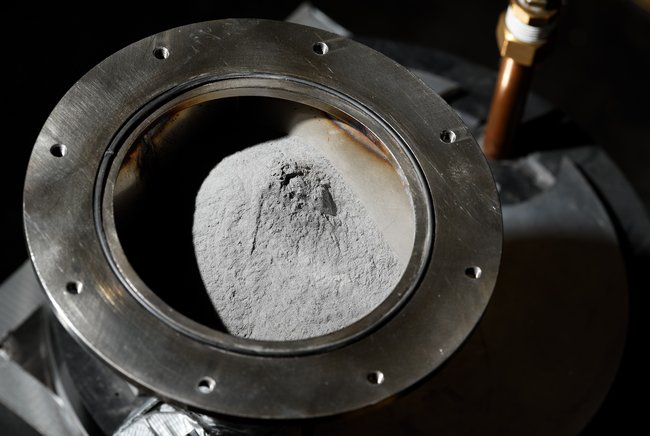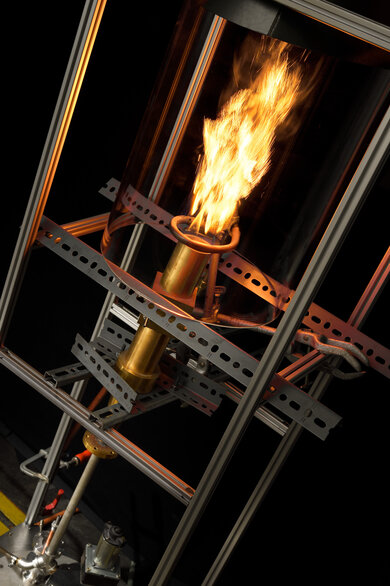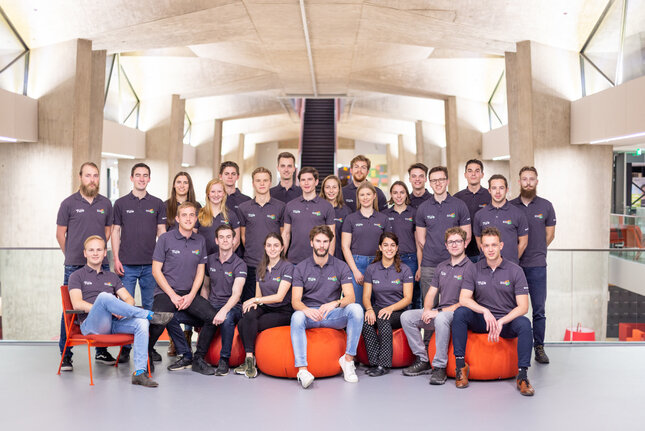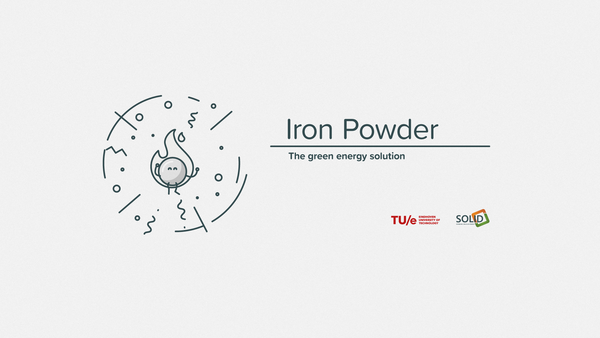Iron powder as the battery of the future: reusable and everywhere to be found

Iron in the tank. It seems like a fairy tale, but iron has a bright future as a fuel. Clean from the pump, no CO2 emissions, that’s what researchers at Eindhoven University of Technology say.
If enthusiasm were a fuel, professors Niels Deen and Philip de Goey would never have to fill up. Just like Mark Verhagen, manager of Team SOLID. The three of them talk enthusiastically at TU Eindhoven about their 'baby', a pilot installation fired with iron powder that produces heat. The structure, developed by the Metal Power consortium to which Team SOLID belongs and is financed by the Province of Noord-Brabant, has no CO2 emissions and the residual product - rust - can be recovered. “Moreover, we don't have to worry that we have any shortage of iron,” says Professor of Combustion Technology De Goey. "Iron is our planet’s most common element.”
Colleague Niels Deen (Mechanical Engineering) calls metal powder a promising energy carrier. “The supply of energy from wind turbines and solar panels fluctuates enormously. Where there is a surplus of supply, you need to be able to store that energy. You can do that with batteries, but that is not suitable for all situations, such as storing large amounts of energy. We are now investigating an alternative: storing energy in iron powder. "When you burn that powder, the energy is released as heat.”
Deen: "Think of the iron powder as a charged battery. When combusted, you get energy from it and what remains is an empty battery in the form of rust. By making iron powder out of the rust again, you recharge the battery. And you can do that over and over again.” The capacity of iron powder for energy storage is impressive.
Turbine
Deen: “Iron powder is also easy to transport and can be recycled. If you combust iron powder with hot gases to drive a turbine or an engine, rust powder remains. Using hydrogen produced from electricity surpluses from sustainable sources you turn it into iron powder again. That's how you extract the oxygen from the rust particles.”

If iron is such a beautiful energy carrier, why is it that we working on it only now? “Human beings have been burning metal for centuries. Think of fireworks, developed by the Chinese. But exactly how it all works is something we've only known for a few years,” says Philip de Goey. According to Niels Deen, there is another important reason: “There has always been an easier alternative: fossil fuels. If they are widely available, cheap and everyone wants to use them, then why look for alternatives? But we have the zeitgeist with us now. ‘Metal fuels’ are benefiting from that.”
Skepticism
De Goey is sure that the focus on iron as a fuel will grow rapidly. “Now that we're scaling it up, everyone wants to join in. No more milligrams and small flames in the lab, no, we're building an industrial incinerator. With an output of up to 1 megawatt. Companies that used to say 'that's fun but let's really see something', are now taking our project very seriously.”
Mark Verhagen adds that he was recently in China “and they were looking at me with skepticism. But that changes when you show them what you're doing. Everyone sees the potential on a larger scale. We work with companies like Shell and Uniper (formerly E.ON).” The first demonstration will take place at the beginning of this year. Around the corner, at Swinkels Family Brewers, the brewer of Bavaria beer. De Goey: ,”We're putting a test rig there. We’re not building that ourselves. That's what other parties in our consortium do, including, for example, Team SOLID.”
That team now has about thirty members. “With all kinds of expertise. Not just technicians. Also people who have a commercial leaning,” says Verhagen. The professors are proud of Team SOLID. Deen: "They're motivated students who don't get paid.” De Goey: “You can see a great social engagement in them.”
Residential neighborhood
In order to get the installation off the ground commercially, a compact, more efficient version is needed. “We can do that. With our current pilot installation, you could power a small residential neighborhood. With a smaller installation, but with a larger capacity of 1 to 10 megawatts, it becomes an attractive option for companies that need to get off the gas grid,” says De Goey.

The professors firmly believe in their project, but it will only be 'part of the solution to the big environmental problem'. Cars won't be running on iron powder for a while. “Three other sectors are already very promising. We are working with the maritime sector to develop sustainable ships, powered by the combustion of iron powder,” says De Goey. “And for any industry that requires high temperatures (for chemical processes of around 1000 degrees) and coal-fired power stations, they can be fired using iron powder. “That's the focus of our attention with Uniper.” Deen: “If you close large Dutch coal-fired power stations, it's a huge obliteration of capital. But if you can convert them without CO2 emissions, with only rust as a residual product, then it becomes attractive to energy companies.”
The Earth has iron ore in abundance. But does that also apply to iron powder? De Goey: “No. There are now about ten suppliers worldwide. With the current supply, you could now convert ten coal-fired power stations and supply them with iron powder. But if market demand increases, then the supply will be there.” Deen: “The big advantage is that you only need to make that powder once. Then you can reuse it constantly. Iron remains iron.”
The following parties participate in the consortium working on the incinerator using iron powder: EM Group, Romico Engineering Solutions, Heat Power, Metalot3C, TU/e, SOLID, Province of North Brabant, Nyrstar, Enpuls, Uniper.
Source: Algemeen Dagblad / Hans van Zon
Help us develop novel ways to store energy
Are you interested in the research of Philip de Goey and Niels Deen or other projects we do on metal fuels? Want to join our researchers in their goal to develop novel ways of energy storage? Check out what Eindhoven University of Technology has to offer.
